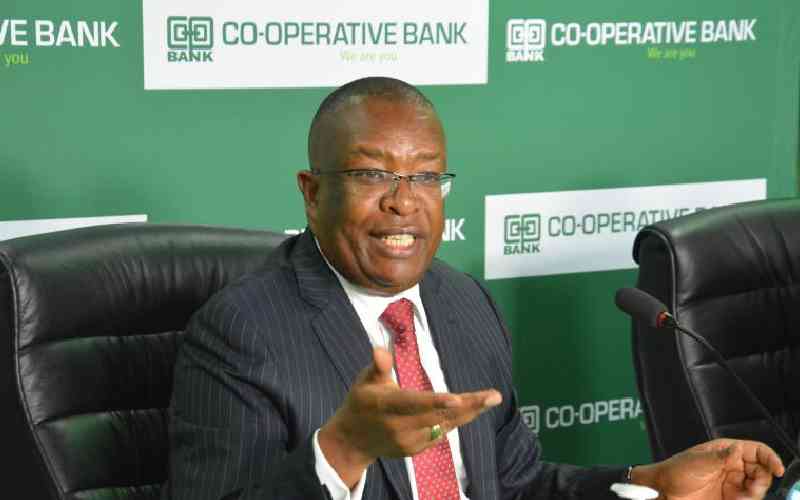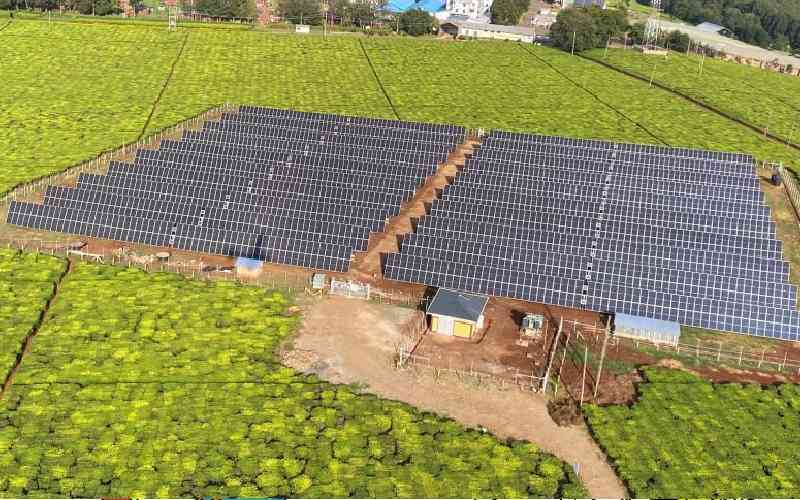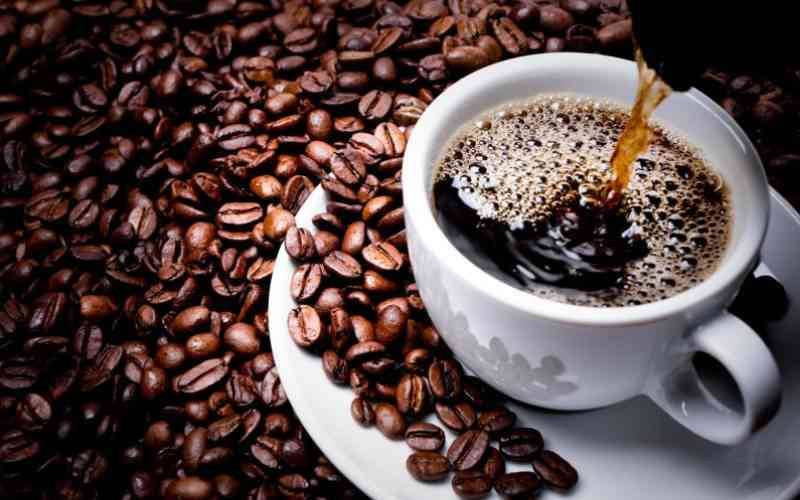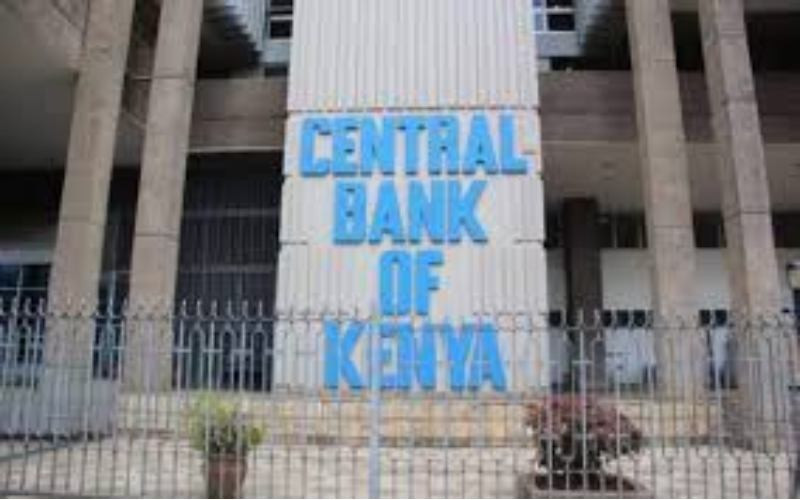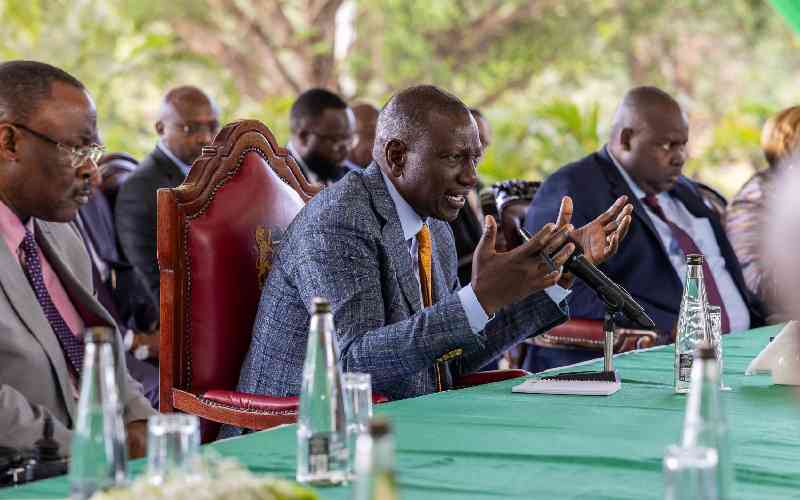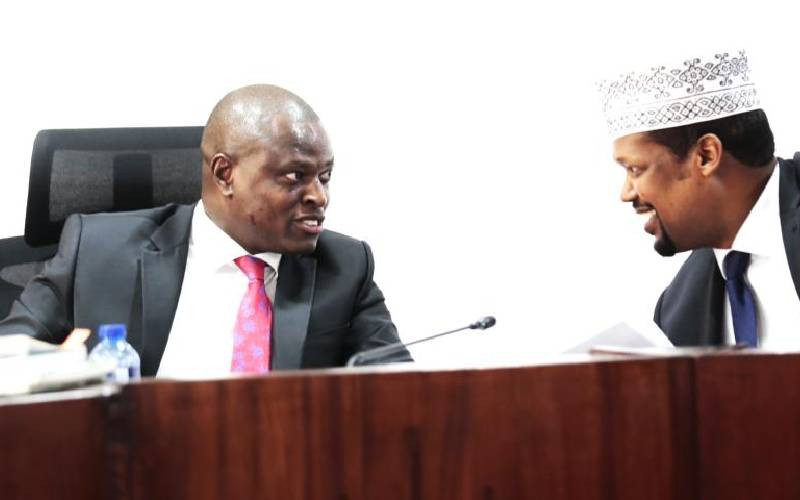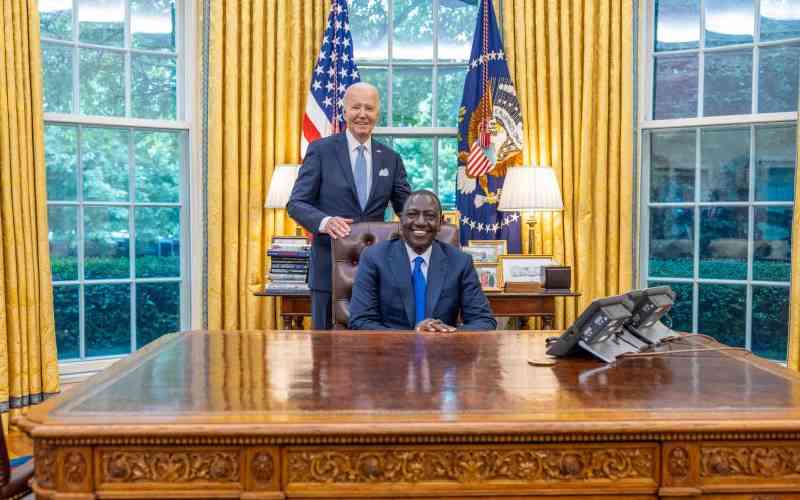
I was standing on the White House lawn in the famed Rose Garden waiting to watch President William Ruto and his host US President Joe Biden walk along the corridor to the Oval Office.
Even though Ruto was yet to arrive, we were all buzzing with anticipation as the iconic walk has been immortalised over the years by various US presidents and their guests.
As journalists who had accompanied President Ruto on this visit, we were here to witness this ritual firsthand.
For Ruto who was staying in nearby Blair House, often referred to as the US president’s guest house, it would be a short hop to the White House and the famous walk into the Oval Office.
We had arrived outside one of the world’s most famous streets; 1600 Pennsylvania Avenue, the official address of the White House, early.
The street in front of the building itself was cordoned off with metal barriers and anyone entering had to stop and go through thorough screening that included metal detectors and sniffer dogs. This took some time. We had to arrive early to be processed.
Upon entry, we were guided up the long driveway to the side of the main building, to a holding area in the press conference room where the White House spokesperson holds briefings.
It was a medium sized affair akin to a small movie theatre with a podium and folding chairs.
It had racks for storage of equipment and a vending machine for water and snacks that after a quick introduction by a member of the White House press corp, we got very well acquainted with.
When time came for the Rose Garden walk, we were shepherded out and taken to a roped off section of the garden with a good view of the corridor and the entrance to the Oval Office. From there we were to film the walk.
I was surprised by the fact that apart from two men sauntering and waving to us, there was nothing more to that event until a regular White House correspondent from one of the local networks explained how seriously they took these rituals.
When President Ruto arrived and the walk was complete, we were shepherded back to the holding room. President Ruto was taken on a private tour of the Oval Office and even sat at the centuries old Resolute Desk.
According to the website whitehousehistory.org, the Resolute Desk is a double pedestal desk made from oak timber of the British ship HMS Resolute - the ship had served its purpose and its timber was removed for use.
In 1880, Queen Victoria gifted the desk to US President Rutherford Hayes who turned it into the official workstation of US presidents.
Americans hold the desk in great reverence and awe.
It is the desk from which laws are signed, treaties with nations and decisions that have changed the world penned including the 1945 decision to use the atomic bomb on Japan and therefore ending World War II.
It was on that desk that the 33rd President of the US Harry Truman, who authorised the use of the atomic bomb on Hiroshima and Nagasaki, had a sign that read “The Buck Stops Here”.
The Truman presidential library indicates on its website that the backside of the sign had the inscription “I am from Missouri”.
The Ruto tour of White House had him in the famous office that is shaped like an egg, from where the spectacular picture of President Ruto sitting at the desk emerged as his host stood behind him.
That alone irked Kenyan writer and scholar Ngugi was Thiong’o so much that he penned an open letter to President Ruto accusing him of selling the soul of the country to the US.
Later that afternoon, we were again led out of our holding room and escorted to the room where the press conference was going to be held.
Officially known as the East Room, it was large and airy, ornate, with gilded fixtures. It had beautiful wooden doors a back drop of three sets of gold drapes complete with gold brocade, behind the two rostrums set up for the two presidents.
Foreign media from Kenya would seat on one side of the isle, while local American media sat on the other with television cameras arrayed to the side and at the back.
The event was a tightly choreographed press conference where the host read off a short speech and then invited his guest to do as well.
The two leaders then took questions from the press. Two from each side, with the journalists asking the questions having been selected earlier.
It was clear that the objectives of the media camps were quite diverse.
While Kenyans wanted to know about Haiti and the Kenyan force to be deployed there, Americans were more concerned with Israel and geopolitics.
The press conference was soon over and we were once again shuffled out of that room and back to the holding area, where having enough material for the day we were anxious to go back to our hotels and file stories.
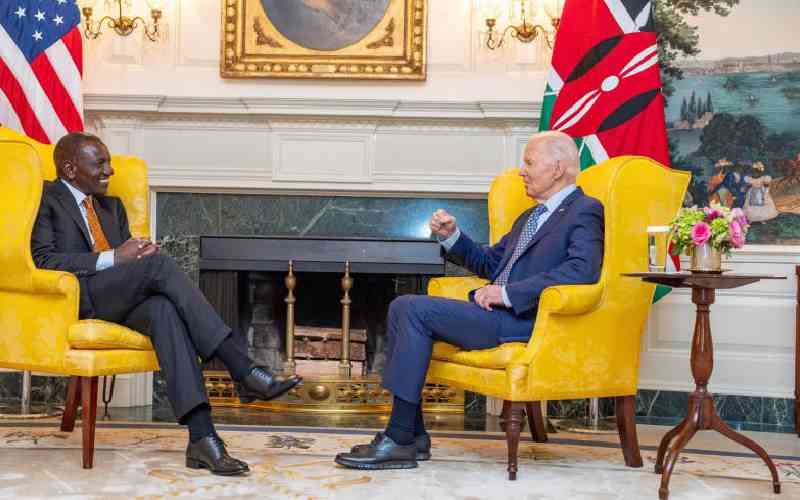
The next day saw us follow an almost similar drill to get to the White House. After the customary sniffing by dogs and accessing the badges again we were marched in, this time to an area on the south lawn already occupied by a crowd.
We are standing on the South Lawn of the White House in a light drizzle, where thousands of Kenyans living and working in the United States braved a light summer shower to be part of history.
With the imposing white edifice that is the White House standing tall and proud in front of them, the large crowd standing on fresh cut green lawns behind a rope cordon waved small flags waiting to see what this reception ceremony will entail.
A military band was rendering out tunes accompanying troops from different military formations ready to troop their colours and mount a guard of honour.
The mood was euphoric and the air was pregnant with expectation of the once-in-a-lifetime spectacle that was set to unfold shortly.
On arrival, President Ruto and First Lady Rachel were welcomed by their hosts outside the South Portico of the White House. As they took their places on the dais, the marine band started playing ‘‘Ruffles and Flourishes’’ and ‘‘Hail to the Chief’’, with a 21-gun salute echoing in the background.
According to the website Whitehousehistory.org, “Hail to the Chief,” with its preceding musical fanfare ‘‘Ruffles and Flourishes’’, is traditionally played to announce the arrival of the US President at official functions. “Hail to the Chief” is attributed to English composer James Sanderson.
The national anthems of both countries were then played, with Americans holding their right hands over their hearts.
Even as we stood at attention, many of us Kenyans watched in mild amusement as the marine band struggled through their rendition of the Kenyan national anthem, cutting a few corners where we would traditionally have lengthy drum rolls and long notes.
When the speeches were over and the crowd breaking u, we journalists paused to catch a final glimpse of the leaders before dashing off to try and file our stories in time to beat the day’s deadlines.
My next and final assignment at the White House was on Thursday, the penultimate day before the President Ruto wrapped up his visit.
This time after the now normalised security routine with sniffer dogs and other checks, we were at the Front Portico to receive President Ruto as he started the day’s rituals to culminate with the State dinner.
Upon his reception and the customary handshake, he and his spouse were ushered in while we journalists re-staged ourselves, to capture the next phase of their entrance.
Traditionally, the evening of the State dinner, President Biden and First Lady Jill Biden greet their guests under the North Portico and escort them to the Yellow Oval Room on the second floor. The President and First Lady with their honoured guests then descend the Grand Staircase to the sounds of ‘‘Ruffles and Flourishes’’ and then greet the assembled guests in protocol order.
After greetings, there was departure from tradition where rather than proceed to the State dinner in the dining room, the guests were led outside where electric trams; open air buses were stationed to take them to the large imposing pavilion on the South Lawn where dinner was served.
It was while waiting our turn to alight the bus, with a crowd of other journalists and guests that the evening served up its best surprise.
‘‘Hey, there’s Barrack Obama’’, someone exclaimed, we scrambled one side of the bus to catch a glimpse of the former president who made the briefest of appearances at the event, coming and going very quickly in the failing light and receiving a symbolic gift from President Ruto at a very brief meeting.
The dinner, particularly the toasts, the cuisine, the music and lighting were something to die for.
Notable guests at the event included former President Bill Clinton, former Secretary of State Hillary Clinton, actor Sean Penn, Melinda Gates, tech executive Sheryl Sandberg and NBA Commissioner Adam Silver.
Members of President Biden’s family who attended, including his son, Hunter Biden, granddaughters Naomi Biden and Finnegan Biden, and sister-in-law Sara Biden.
The start of the dinner was set to coincide with the sunset, with more than 1,000 candles lit for the event and a suspended centerpiece with some 15,000 layered reflective metallic strips reflecting the candlelight.
Entertainment was provided by country singer Brad Paisley of the Whisky lullaby fame, who performed hits like ‘‘American Saturday Night’’.
Also performing was the gospel choir of Howard University. The institution was founded in 1867 as a black research institution.
The university was central to the presidential visit, for signing a deal to partner with Kenya institutions in education and research.
The dinner’s first course consisted of chilled green tomato soup, with marinated onions and cucumber marinated in white balsamic vinegar, while lobster poached in butter, with marinated and lightly smoked short ribs served as an entree.
A homemade white chocolate basket filled with a nectarine paste, a banana ganache, fresh raspberries, and peaches was served as desert.
As night fell, journalists were ushered out, to leave the guests to let their hair down and dine in peace away from the glare of media.
As we left the White House compound for the last time, silent and still awestruck by the opulence and grandeur of the reception, we were once again jolted to reality by the need to swiftly and keenly file our stories to beat our deadlines.
As the heavy steel door at the gates slammed shut behind me, I was jolted awake, realising that apart from my recollection of the events at The White House, the bang of the bus door opening automatically in the present had jolted me.
‘‘Let’s get off the bus’’, one of the embassy handlers said, anxious to get us through security at our last stop of the entire State visit before President Ruto and his entourage arrived.
It was here that President Ruto oversaw the signing of several deals that included training, supply and joint exercise agreements that were part of the move to designate Kenya a non-NATO US ally.
President Ruto was received by Secretary of Defence Lloyd Austin III who announced that three Kenyan cadets have been admitted to US military service academies as further evidence of the close partnership between the two countries.
‘‘I’m pleased to announce that three Kenyan cadets have been admitted to three US military service academies.
‘‘They will be the first Kenyan cadets to attend these outstanding schools.
‘‘And I’m confident that they won’t be the last.’ Said Austin.
The Lloyd also lauded the fact that a memorandum of understanding had been signed between the two countries at the State Department earlier in the week to expand Manda Bay airfield in Lamu to receive bigger aircraft.
‘‘Mr President, we’re delighted to have you here. Thanks for coming, and I look forward to a great conversation. And with that, we’ll allow our friends in the media to depart,’’ he said.
And with that, the chants of, ‘‘thank you media’’, which meant we were no longer welcome in the room and were being excused, bringing to a close a week of hectic, frenetic travel and shuttling from location to location to bring the details of the Kenya’s president State visit to the masses back home.
As we walked out of the room under the close watch of military security and the secret service, before walking into our bus I paused and had one last, long look at the Pentagon; that famous fabled building whose image is screened in movies back home - it looked the same.
As the bus drove out of the complex, I replayed the scenes at the various historic buildings, like the White House, The Senate and the Pentagon, where we had spent our week shadowing President Ruto and the Leader of the Free World.
I thought to myself that whenever he wasn’t being wined, dined, saluted or being ushered into some office or historic corridor, President Ruto must have been saying to himself…. ‘mwalimu wa maths… hapa ni wapi?’
 The Standard Group Plc is a multi-media organization with investments in media platforms spanning newspaper print
operations, television, radio broadcasting, digital and online services. The Standard Group is recognized as a
leading multi-media house in Kenya with a key influence in matters of national and international interest.
The Standard Group Plc is a multi-media organization with investments in media platforms spanning newspaper print
operations, television, radio broadcasting, digital and online services. The Standard Group is recognized as a
leading multi-media house in Kenya with a key influence in matters of national and international interest.

